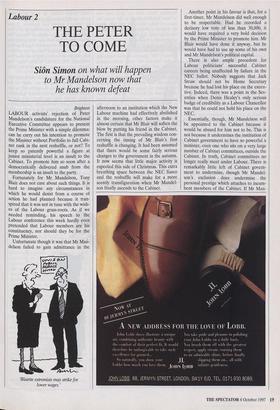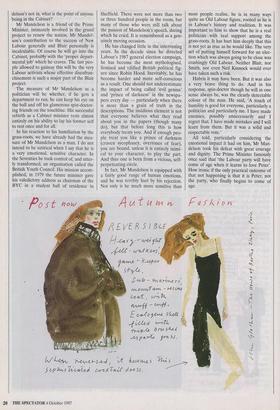Labour 2
THE PETER TO COME
Sion Simon on what will happen
to Mr Mandelson now that he has known defeat
Brighton LABOUR activists' rejection of Peter Mandelson's candidature for the National Executive Committee appears to present the Prime Minister with a simple dilemma: can he carry out his intention to promote the Minister without Portfolio to full Cabi- net rank in the next reshuffle, or not? To keep so patently powerful a figure at junior ministerial level is an insult to the Cabinet. To promote him so soon after a democratically delivered snub from the membership is an insult to the party.
Fortunately for Mr Mandelson, Tony Blair does not care about such things. It is hard to imagine any circumstances in Which he would desist from a course of action he had planned because it tran- spired that it was not in tune with the wish- es of the Labour grass-roots. As if we needed reminding, his speech to the Labour conference this week hardly even pretended that Labour members are his constituency, nor should they be for the Prime Minister.
Unfortunate though it was that Mr Man- delson failed to gain admittance in the Biairite extremists may strike for lower wages.' afternoon to an institution which the New Labour machine had effectively abolished in the morning, other factors make it almost certain that Mr Blair will soften the blow by putting his friend in the Cabinet. The first is that the prevailing wisdom con- cerning the timing of Mr Blair's first reshuffle is changing. It had been assumed that there would be some fairly serious changes to the government in the autumn. It now seems that little major activity is expected this side of Christmas. This extra breathing space between the NEC fiasco and the reshuffle will make for a more seemly transfiguration when Mr Mandel- son finally ascends to the Cabinet. Another point in his favour is that, for a first-timer, Mr Mandelson did well enough to be respectable. Had he recorded a derisory low vote of less than 30,000, it would have required a very bold decision by the Prime Minister to promote him. Mr Blair would have done it anyway, but he would have had to use up some of his own and Mr Mandelson's political capital.
There is also ample precedent for Labour politicians' successful Cabinet careers being unaffected by failure in the NEC ballot. Nobody suggests that Jack Straw should not be Home Secretary because he had lost his place on the execu- tive. Indeed, there was a point in the Sev- enties when Denis Healey's only serious badge of credibility as a Labour Chancellor was that he could not hold his place on the NEC.
Essentially, though, Mr Mandelson will be appointed to the Cabinet because it would be absurd for him not to be. This is not because it undermines the institution of Cabinet government to have so powerful a minister, even one who sits on a very large number of Cabinet committees, outside the Cabinet. In truth, Cabinet committees no longer really meet under Labour. There is remarkably little left of Cabinet govern- ment to undermine, though Mr Mandel- son's exclusion does undermine the personal prestige which attaches to incum- bent members of the Cabinet. If Mr Man- delson's not in, what is the point of anyone being in the Cabinet? Mr Mandelson is a friend of the Prime Minister, intimately involved in the grand project to renew the nation. Mr Mandel- son's contribution to the success of New Labour generally and Blair personally is incalculable. Of course he will go into the Cabinet, probably with the 'proper depart- mental job' which he craves. The last peo- ple allowed to gainsay this will be the very Labour activists whose effective disenfran- chisement is such a major part of the Blair project. The measure of Mr Mandelson as a politician will be whether, if he gets a department to run, he can keep his eye on the ball and off his glamorous spin-doctor- ing friends on the touchline. His successful rebirth as a Cabinet minister rests almost entirely on his ability to lay his former self to rest once and for all.
In his reaction to his humiliation by the grass-roots, we have already had the mea- sure of Mr Mandelson as a man. I do not intend to be satirical when I say that he is a very emotional, sensitive character. In the Seventies he took control of, and utter- ly transformed, an organisation called the British Youth Council. His mission accom- plished, in 1979 the future minister gave his valedictory address as chairman of the BYC in a student hall of residence in Sheffield. There were not more than two or three hundred people in the room, but many of those who were still talk about the passion of Mandelson's speech, during which he cried. It is remembered as a gen- uinely moving occasion. He has changed little in the intervening years. In the decade since he directed Labour's 1987 general election campaign, he has become the most mythologised, lionised and vilified British political fig- ure since Robin Hood. Inevitably, he has become harder and more self-conscious as a result. One should not underestimate the impact of being called 'evil genius' and 'prince of darkness' in the newspa- pers every day — particularly when there is more than a grain of truth in the descriptions. The insidious element is not that everyone believes what they read about you in the papers (though many do), but that before long this is how everybody treats you. And if enough peo- ple treat you like a prince of darkness (craven sycophancy, overtones of fear), you are bound, unless it is entirely inimi- cal to your character, to play the part. And thus one is born from a vicious, self- perpetuating circle. In fact, Mr Mandelson is equipped with a fairly good range of human emotions, and he was terribly hurt by his rejection. Not only is he much more sensitive than most people realise, he is in many ways quite an Old Labour figure, rooted as he is in Labour's history and tradition. It was important to him to show that he is a real politician with real support among the grass-roots. It has hurt him deeply that this is not yet as true as he would like. The very act of putting himself forward for an elec- tion which was always going to be close was crashingly Old Labour. Neither Blair, nor Smith, nor even Neil Kinnock would ever have taken such a risk.
Hubris it may have been. But it was also a very brave thing to do. And in his response, spin-doctor though he will in one sense always be, was the clearly detectable colour of the man. He said, 'A touch of humility is good for everyone, particularly a politician and particularly me. I have made enemies, possibly unnecessarily and I regret that. I have made mistakes and I will learn from them. But it was a solid and respectable vote.' All told, particularly considering the emotional impact it had on him, Mr Man- delson took his defeat with great courage and dignity. The Prime Minister famously once said that 'the Labour party will have come of age when it learns to love Peter'. How ironic if the only practical outcome of that not happening is that it is Peter, not the party, who finally begins to come of age.











































































 Previous page
Previous page